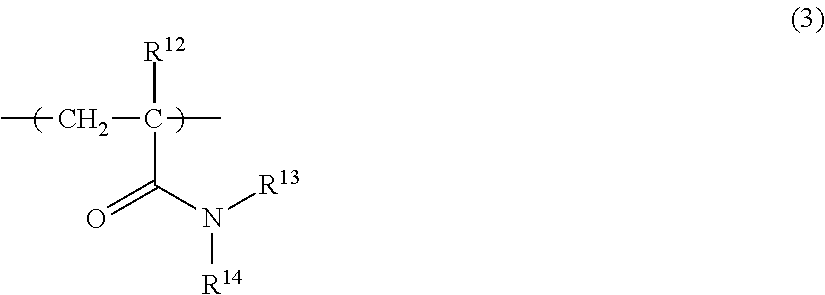Polymer composition, article, medical device, article production method, and cell cluster production method
- Summary
- Abstract
- Description
- Claims
- Application Information
AI Technical Summary
Benefits of technology
Problems solved by technology
Method used
Image
Examples
synthesis example 1
Synthesis of Copolymer (N-1)
[0390]In a flask, 8.5 g of methoxypolyethylene glycol (23) monomethacrylate (M-230 G (manufactured by Shin-Nakamura Chemical Co., Ltd.); hereinafter, referred to as “MPEGM”. It is noted here that “polyethylene glycol (23)” means “(OC2H4)23”, and the same applies hereinbelow), 0.25 g of NHmethacryloyloxyethyl-N,N-dimethylammonium-α-N-methylcarboxy betaine (GLBT (manufactured by Osaka Organic Chemical Industry Ltd.); hereinafter, referred to as “GLBT”), 1.25 g of lauroxypolyethylene glycol (30) monomethacrylate (PLE-1300 (manufactured by NOF Corporation); hereinafter, referred to as “LPEGM”), 0.1 g of 2,2′-azobis(isobutyronitrile) (manufactured by Wako Pure Chemical Industries, Ltd.; hereinafter, referred to as “AIBN”) as a polymerization initiator, and 27 g of pure water and 63 g of acetonitrile as a solvent were added and mixed together. Then, nitrogen was blown into the resulting mixture, and the mixture was heated to 60° C. and allowed to polymerize for...
synthesis example 2
Synthesis of Copolymer (N-2)
[0393]In a flask, 8.5 g of acryloyl morpholine (ACMO (manufactured by KJ Chemicals Corporation); hereinafter, referred to as “ACM”), 0.25 g of GLBT, 1.25 g of LPEGM, 0.1 g of AIBN, 27 g of pure water, and 63 g of acetonitrile were added and mixed together. Then, nitrogen was blown into the resulting mixture, and the mixture was heated to 60° C. and allowed to polymerize for 4 hours, after which the resultant was cooled to room temperature. Thereafter, the thus obtained solution was dialyzed with pure water, whereby an aqueous solution of a copolymer (N-2) was obtained.
[0394]In the thus obtained copolymer (N-2), the content of an ACM-derived repeating unit was 85° by mass; the content of a GLBT-derived repeating unit was 2.5% by mass; and the content of an LPEGM-derived repeating unit was 12.5% by mass.
[0395]Further, the thus obtained copolymer (N-2) had a weight-average molecular weight of 455,000, a number-average molecular weight of 137,000, and a molec...
synthesis example 3
Synthesis of Copolymer (N-3)
[0396]In a flask, 8.5 g of dimethylacrylamide (DMAA (manufactured by KJ Chemicals Corporation) ; hereinafter, referred to as “DMA”), 0.25 g of GLBT, 1.25 g of LPEGM, 0.1 g of AIBN, 27 g of pure water, and 63 g of acetonitrile were added and mixed together. Then, nitrogen was blown into the resulting mixture, and the mixture was heated to 60° C. and allowed to polymerize for 4 hours, after which the resultant was cooled to room temperature. Thereafter, the thus obtained solution was dialyzed with pure water, whereby an aqueous solution of a copolymer (N-3) was obtained.
[0397]In the thus obtained copolymer (N-3), the content of a DMA-derived repeating unit was 85% by mass; the content of a GLBT-derived repeating unit was 2.5° by mass; and the content of an LPEGM-derived repeating unit was 12.5° by mass.
[0398]Further, the thus obtained copolymer (N-3) had a weight-average molecular weight of 499,000, a number-average molecular weight of 125,000, and a molecu...
PUM
| Property | Measurement | Unit |
|---|---|---|
| Solubility (mass) | aaaaa | aaaaa |
Abstract
Description
Claims
Application Information
 Login to View More
Login to View More - R&D
- Intellectual Property
- Life Sciences
- Materials
- Tech Scout
- Unparalleled Data Quality
- Higher Quality Content
- 60% Fewer Hallucinations
Browse by: Latest US Patents, China's latest patents, Technical Efficacy Thesaurus, Application Domain, Technology Topic, Popular Technical Reports.
© 2025 PatSnap. All rights reserved.Legal|Privacy policy|Modern Slavery Act Transparency Statement|Sitemap|About US| Contact US: help@patsnap.com



